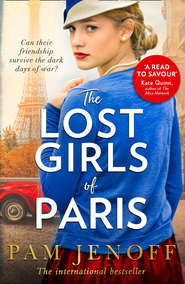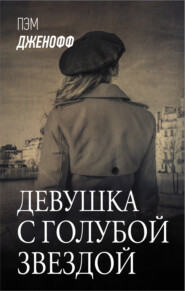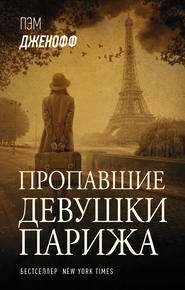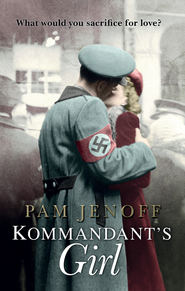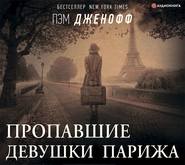По всем вопросам обращайтесь на: info@litportal.ru
(©) 2003-2024.
✖
The Last Embrace
Настройки чтения
Размер шрифта
Высота строк
Поля
He shook his head. “Nah, kid. My cub reporter’s been called up so I need someone to help me cover the meeting. You were the best one for the job.”
“The best one? I’m a typist. I can’t possibly cover a story.”
“Just take one of the chairs against the wall and take notes. And don’t say anything,” he instructed, then disappeared into a group of uniformed men clustered in the corner.
I took off my overcoat and folded it in the lap of my navy blue skirt, noticing as I sat down a run in my nylons. Then I tried to smooth the wrinkles from my pleated-front blouse. I was the only woman in the room, except for the one setting out coffee cups. The war might have brought women to work, Rosie the Riveter and all that, but in high-level Washington meetings like this, the seats at the table were still reserved for the men.
The door opened and a man I recognized from the papers as Undersecretary of State Edward Stettinius came in. “Be seated,” he said, as the others came to the table. “I’ve only got a few minutes so I’ll be brief. I’ve called you here to ask for your help in talking to the American people about the war.” He launched into a discussion of a new initiative by the Office of War Information to work with the press on the way it would communicate information about the fighting.
I scribbled furiously. Though I frequently typed the shorthand notes of others, I had seldom taken dictation and I feared I would not be able to keep up with Secretary Stettinius’s rapid English. But as I listened, I became absorbed by what he was saying. The relationship between newspapers and government had always seemed adversarial, one seeking information and the other holding it back. But he was speaking now of ways they could work together. “I’m happy to take your questions,” he concluded a few minutes later.
A correspondent from the Washington Star whom I did not recognize raised his hand, then spoke without waiting. “It sounds good on the surface—but isn’t it something of a conflict of interest?” I had been wondering the same thing: Could the newspapers still maintain their independence and integrity while working with the government?
Secretary Stettinius offered a vague explanation of how it would all work without compromising the independence of the press.
“Surely you aren’t suggesting we show you our stories before they go to press?” another reporter pressed. “That would be censorship.”
“No, of course not,” Secretary Stettinius replied, looking tugging at his collar. “We simply want to be a resource.” Across the room, Mr. Steeves folded his arms, unconvinced. “My deputy will be in touch with each of you individually to discuss specifics,” Secretary Stettinius promised, cutting the questions short. He rose, signaling that the meeting was over.
As the newsmen stood and chatted among themselves, I tried to catch Mr. Steeves’s eye, but he was engrossed in conversation with a foreign correspondent. I made my way toward the door of the too-stuffy room, uncertain whether to wait for him or return to the bureau.
As I neared the massive foyer, a door across the hallway opened, letting loose a low din of chatter from another meeting. I started past. “Then we are agreed,” a voice broke through the others, unexpectedly familiar. I stopped mid-step. “We’ll meet again when we have the plans drawn up.”
Charlie! My head swiveled in the direction from which the voice had come. It couldn’t be. I craned my neck, trying once more to hear the voice. I had imagined him so many times since coming here, seen him in every uniformed soldier on the street corners. But I’d never heard his voice.
I stepped toward the door of the other room, not caring that I had no business being there as I scanned the crowd. “Oh!” I cried so loudly that a man in front of me turned to stare. I brought my hand to my mouth as Charlie’s broad shoulders appeared above the others. Joy surged through me, making my head light. It really was him. But how? There was no reason on earth for him to be in Washington. He was meant to be off training somewhere or deployed, not standing in front of me, tall and glorious. Had he come for me? No, there was simply no way he could have known I was here—which was exactly how I had wanted it.
Anxiety rose, eclipsing my happiness, and the walls of the immense room seemed to grow close. I started to duck away, the idea of facing Charlie unfathomable. But even as I took a step toward the door, I turned back, drawn to him. He looked different to be sure, aged by all that had happened, with lines in places I hadn’t remembered and a permanent sadness about the eyes. His brown hair was cut short and it was thinner, too, without the thick, rich curls he had once had. He was still beautiful, though. My breath caught. That did not, could not, change what had happened. I had to leave. Now.
I stepped back toward the corridor, my ankle turning inward and causing me to stumble. As I struggled not to fall, I dropped my notebook, which clattered against the marble. Heads turned in my direction, seeming more annoyed than concerned. As the others resumed their conversations, Charlie stepped from the group and moved toward me in the hall, his face breaking. “Addie?” His tone was disbelieving. I froze, unable to move or speak as he drew close. He reached out, as if to touch me, but his hand foundered midair before falling to his side again. He leaned in to kiss my cheek and his familiar scent made the room wobble. I struggled not to turn and meet his lips with my own. “Addie.” There it was in that single word, that voice which cut right through and connected with my insides as it had since the first time I heard it. “What are you doing here?” He didn’t know any of it—that I had left Philadelphia, or how I had come to be here. Because he had gone first.
“I’m working for the Post.” I watched his face for any sign of disbelief. But Charlie had never doubted me. “I never expected you to be in Washington,” I added.
His face flinched slightly as though he had been slapped. “You aren’t pleased to see me.”
“Of course I am. It’s just that I thought you were training.” My words came out too quickly, piling on top of one another.
He fumbled with the hat, neatly folded in his hands. “I was, for almost a year. But now I’m here for some extra briefings.” There was a strange undercurrent to his voice. A year had slipped through our fingers. How was that possible? Once it had seemed unthinkable to keep breathing without Charlie, but somehow the clock had kept ticking. I tried to imagine his days in between, all of the things he had done and seen since we’d last laid eyes on one another. But my mind was blank.
“Your hair,” he blurted. I raised my hand to my temple, wincing at how tousled I was from the rain. “It’s short.” It was the bob, so different than last time he had seen me. “I mean, I like it.” I couldn’t tell if he was just being kind.
“How’s your family?”
“Holding up as well as can be expected.” He shrugged, helpless but not indifferent. “My folks are in Florida. Mom has thrown herself into the women’s auxiliary.” It sounded so much like Mrs. Connally that I had to smile. “Dad’s Dad.” Guilt at having left them flickered across his face. “It tore them apart, you know.” Yes, I knew only too well. The Connallys lived in a place where their grief would always be as raw as the day it all happened, no matter how much time passed or how far away they moved. “They’re together, but in a separate kind of a way. They know now,” he added, and I wanted to ask if he meant about the army, or what had been between us, or both.
The question stuck in my throat. “And the boys?” I asked instead.
“Jack, well, he works at a plant in Port Richmond. He’s taking night classes at Temple, though.” Jack had been the real brain of the boys—he might have gone to an Ivy League school and practiced medicine as he once dreamed, but for money and circumstance. “He hasn’t been called up yet, thank God. Mom couldn’t bear to lose another son.”
I swallowed. “And Liam?”
Charlie stared hard at the floor. “I’m not sure.” But surely his parents knew about Liam’s whereabouts, and whether or not he was okay. Or had they cut ties with him as well? My stomach tugged. I still hated Liam for what he had done, yet I could not help but worry.
Charlie and I watched one another, not speaking. We had talked about everyone, of course, except the one name we could not say. “How long will you be in town?” I asked, not sure what answer I was hoping to hear.
Before Charlie could reply, voices came from the conference room behind him. He looked over his shoulder. “There’s another meeting. I’m going to have to go.” A knife ripped through me at the idea that he might leave again just as quickly as he had appeared. “Addie, I want to talk to you. Meet me tonight?” he said suddenly. “The Old Ebbitt Grill at seven.” So he did not want our chance reunion to end either.
I peered at him, trying to read the meaning behind his words. Were we merely two old friends, trying to catch up? No, it was still there, that hungry, yearning look in his eyes I had first seen the night on the dock. He wanted to pick up once more and return to that moment when we had stood on the edge of the world, gazing down at everything that lay before us. He wanted to make things whole again.
Something licked at my insides then, familiar like a forgotten dream: hope. Even after everything that had happened, Charlie still reached a place in me that made me believe things could be good again.
But something held me back. “I don’t know.” I was suddenly angry. Did he really think we could put all of those broken pieces back together and not see the cracks? Doubt thundered beneath my feet like a freight train and the ground began to sway. I had managed to make my way back from the place that nearly killed me and stand despite it all. I could not afford to let him in and risk going there again.
“Please, Addie. I’ll wait for you.” There was a desperation about him I had only seen once before in my life. Before I could answer, the men spilled forth from the conference room, enveloping Charlie, and we were separated by a sea of suits and uniforms giving off the odor of cologne and cigarette smoke. I had not had the chance to answer.
Our eyes met and locked, his making a silent plea before he slipped from sight.
(#ulink_0fa72b93-6cba-5179-9cc6-573aee6565e8)
Philadelphia June 1941 Two years earlier
I struggled to stand in the crush of unwashed bodies that surged forward from the ship on all sides. Then I squeezed my way to the side of the dock, pressing back against a rotted wood railing that I hoped would hold. I lifted myself to the tips of my toes in Mamma’s too-large shoes, struggling to see above the ocean of heads around me. Shoulders pushed close, blocking my view. I hoisted myself onto the rail, grasping it tightly so as not to fall, and scanned the sea of travelers. I wished that I might see the familiar face of one of the girls from steerage (not that they had been so friendly). But I recognized no one from the massive ocean liner, even after traveling on it for seven wretched, seasick days.
The travelers moved in small clumps, couples and families of three or four. Across the wharf, a woman flew into the arms of a man waiting for her, reunited. Everyone was carrying things, boxes and bags and children. But I was alone, my hands empty. Worry mixed with the hunger that had been gnawing at my stomach, growing to a burn. In her haste, Mamma had not given me so much as an address for my aunt and uncle who were supposed to take me in. What would I do if no one came for me?
Think. I inhaled, then took in the scene again, framing it and trying to find the right angle to make sense of the situation. Back home I might have snapped a photo with the old camera Papa had given me. But here I was overwhelmed by the chaos, great swirls of strangers moving in all directions, colliding with one another. A dog trotted along the edge of the dock, sniffing at garbage. Even a stray seemed to somehow know where it was going.
Looking around the smelly, crowded harbor, my spirits sank. Lucky, I’d heard a woman remark days earlier as the Italian coastline had faded from view. Heads around her had bobbed in agreement: we were fortunate to be away from the violence that had worsened ominously against the Jews in recent months. But as the ship pulled from the Stazione Maritima, I did not feel lucky, but alone. My parents were still there—and I wanted to go back.
“You!” a male voice barked, and I turned with a flicker of hope. Perhaps my uncle had found me after all. But it was one of the burly stevedores who had herded us from the boat. “Down!” I scrambled from the railing, trying to fade into the crowd. The travelers had moved forward, though, dwindling and leaving me exposed like a broken shell on the beach at low tide. “Keep moving.” It had been like this the whole of the trip, deckhands shouting orders to the lower-class passengers, not bothering to maintain a pretense of courtesy. “Someone here to get you?” the man pressed.
I processed his English slowly. Good question. What if the message had not gotten through and no one was coming for me? Perhaps they would let me go back, I thought with fleeting joy. But after all of the struggle to get me out of Italy, Mamma would think that a failure.
It was only a week ago that I had been reading in our two-story apartment just off the Via del Monte, snug in the bedroom that I had shared with Nonna before she passed two years earlier, when Mamma came running in, breathless. “We have to go.” Downstairs, Papa was throwing papers into the fire that never burned in summer, with an energy I thought he no longer possessed. “Come!” Mamma ordered, urging me down to the street, and lifted me onto the handles of her bike.
“Where are we going?”
My mother did not answer, but pedaled fiercely through the darkened streets. It was after curfew and I feared the police might stop us. We neared the harbor, drawing close to the docks where too many people were crowding onto a rickety ship. Mamma stopped, climbed off and pulled me from the bike, breathing heavily. Perspiration glistened on her forehead and cheeks. “You have to go first.”
I stared at her in disbelief. “Where?”
“America.” She handed me a satchel heavy with coins, and a ticket and papers, though real or forged I could not say.
She could not possibly be serious. I reached for her, panicking. “I can’t go alone!” The sight of the dark water behind the ship filled me with terror.
“There’s no other way. You’ll be fine. You’re strong.” Mamma had never coddled me, forcing me to find my own way from our apartment through the city to market from a young age and do almost everything for myself. It was as if she had known and somehow been planning for this.
“Why now?”






